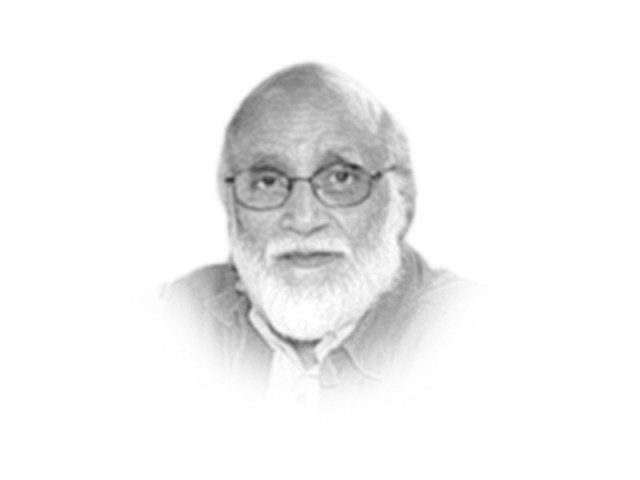Why do Pakistani columnists make up history?
Is it because they believe an anecdote, even invented ones, will be more convincing than stark rational statements.

The writer is Professor Emeritus at the University of Chicago and is the author of two collections of topical essays: A Killing in Ferozewala and The Muslim League in Barabanki published by City Press Karachi
Never mind that Ronald Reagan, a rich film star before he turned to politics, was always a dandy dresser, and wore only bespoke suits made by a tailor in Hollywood.
Javed Chaudhry, equally prominent, also writes in the Daily Express. Not too long ago, he decided to comment on the state of ‘governance’ in Pakistan. His thesis: when a state’s writ disappears, the state itself soon disappears. He opened with a long reminder of the fate of the last Mughal emperor, ending with a grand flourish before finally turning to contemporary Pakistan. There were 6,000 soldiers with Bahadur Shah, Chaudhry declared, when Captain Hodson arrived at Humayun’s Tomb with only 90 soldiers. But the emperor readily surrendered “his ancestors’ swords” to save his own life. And then “the 90 troopers of Hodson disarmed those 6,000 Mughal soldiers and marched them back to the Red Fort. And there in the open, they hanged them one by one. Only those men survived for whom no rope was readily available to the gora force.”
Never mind if execution by hanging does not require a change of rope with every victim, or that Hodson could have as easily used a firing squad on the remaining few as was being done elsewhere in Delhi.
Dr Safdar Mahmood, a most senior columnist, writes in the daily Jang. Recently, he desired to inform his admirers that what mattered in human actions was jazba (emotion; sentiment). Let’s ignore that Iqbal had more profoundly expressed the same, invoking the concept of ishq (passion). Let’s simply follow Dr Mahmood, who opened his column thus: “The fact of the matter is that without jazba, nothing great can be achieved in life, and no great service can one do to one’s community … When, considering the leaders of the recent past, I seek an example for jazba. Sir Syed Ahmad Khan lights my way … .” He then gives several examples of Sir Syed’s all-consuming devotion to the cause of his college, ending with this anecdotal flourish: “Once he was trying to raise funds at a public meeting but the audience was not attentive. So he said, ‘When you go to enjoy a mujra, you empty your pockets, but you give me the cold shoulder while I speak of the community’s cause.’ A wit in the audience shouted: ‘We’d empty our pockets for you too if you performed a mujra.’ Sir Syed, with his venerable white beard, immediately tucked his shirt into his shalwar and started dancing. What do you think then happened? People took out whatever money they had in their pockets and put it in Sir Syed’s hands.”
Never mind that aside from there being no record of such an incident in any biography of Sir Syed, the men who wore shalwars never tuck their shirts inside when they dance, for that would be considered obscene.
Orya Maqbool Jan, another stalwart, writes for the daily Dunya. Concerned about the rate of literacy in Pakistan, he recently wrote a piece based on a 2012 Unesco report that suggested that the cohort of Pakistanis between the ages of 25 and 44 had a higher percentage of illiterates (57 per cent) than the next older cohort of those between 45 and 54 (46 per cent). And compared with both, the Pakistanis between the ages of 55 and 64 — i.e., those born between 1948 and 1957 — had the lowest number (38 per cent). The blame for the decline, according to Jan, lay on those who encouraged and patronised education through the medium of English — a dubious conclusion, though certainly not inane. However, Jan couldn’t resist a grand finish: “When in 1857, the British expanded their authority over the whole of India, they put into place their Western educational system in order to destroy the existing system. In 1879, Gazetteers were written for every district. They are preserved in the Punjab Archives. According to them, in 1879, the percentage of literacy among Indians was 90 per cent. When the British left this country in 1947, that rate had come down to 15 per cent. Education in this country was first destroyed by the ‘White Angrez,’ and now the same is being done by the ‘Black Angrez.’”
Never mind that, by that logic, Pakistan began in 1947 with a population that was only 15 per cent literate, and then in eight years that number more than quadrupled — thanks, no doubt, to bureaucrats like Mr Jan — before nefarious English lovers started the decline.
All four pieces of writing are lively; they are well-intentioned too. So why couldn’t their authors resist concocting ‘facts’ when there was actually no need to do so? Why couldn’t they resist making a rhetorical flourish even at the cost of truth? Is it because they believe an anecdote, even an invented one, will be more convincing to their readers than a stark statement based on rationality and logic? Or is it simply because they know they can do it — that they can get away with anything in Pakistan, so long it is in Urdu?
Published in The Express Tribune, February 4th, 2014.
Like Opinion & Editorial on Facebook, follow @ETOpEd on Twitter to receive all updates on all our daily pieces.














COMMENTS
Comments are moderated and generally will be posted if they are on-topic and not abusive.
For more information, please see our Comments FAQ